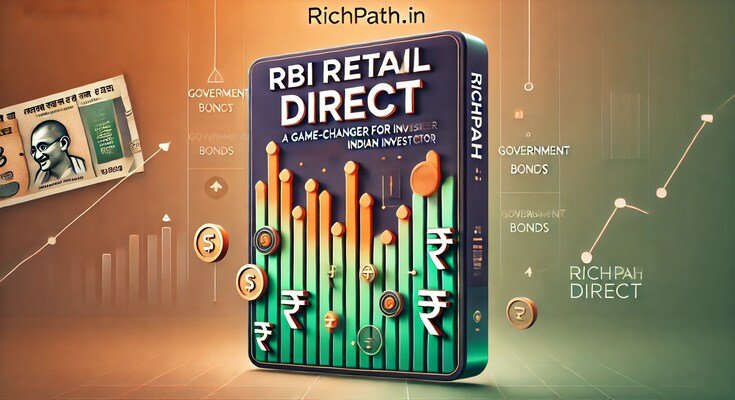
The Reserve Bank of India (RBI) launched the RBI Retail Direct Scheme to provide individual investors with direct access to government securities (G-Secs). This initiative bridges the gap between retail investors and the government bond market, allowing them to participate in risk-free investment opportunities.
In this article, we explore the RBI Retail Direct Scheme, how it works, its benefits, practical examples, and why it is a significant step for Indian investors.
What is RBI Retail Direct?
The RBI Retail Direct Scheme enables retail investors to invest in G-Secs directly without any intermediary. It offers an online platform where individuals can buy, sell, and hold government bonds. These securities include:
- Treasury Bills (T-Bills).
- Government of India (GoI) bonds.
- State Development Loans (SDLs).
- Sovereign Gold Bonds (SGBs).
Key Features of the RBI Retail Direct Scheme
- User-Friendly Portal
Investors can access government securities through the RBI’s Retail Direct portal. - Free Registration
Registration is free, and investors can open a Retail Direct Gilt (RDG) account online. - No Intermediaries
Transactions are directly between the investor and the government, ensuring transparency. - Low Risk
G-Secs are considered the safest investment as they carry zero default risk. - Flexibility
Investors can invest in short-term T-Bills or long-term bonds, depending on their goals.
How to Register for RBI Retail Direct
Step-by-Step Guide:
- Visit the Portal
Go to the official RBI Retail Direct website. - Provide Basic Information
- PAN card details.
- Bank account details.
- Email ID and mobile number.
- Verify Identity
Complete KYC (Know Your Customer) verification online. - Open RDG Account
Once verified, an RDG account is created. - Start Investing
Use your RDG account to bid for securities during auctions or buy them in the secondary market.
Benefits of RBI Retail Direct for Indian Investors
1. Accessibility
Retail investors no longer need to rely on banks or brokers to access G-Secs.
2. Transparency
The direct platform ensures fair pricing and eliminates hidden charges.
3. High Safety
Investing in G-Secs is risk-free, as they are backed by the Indian government.
4. Steady Income
Long-term bonds offer regular interest payments, making them ideal for retirees.
5. Portfolio Diversification
G-Secs add a low-risk component to your portfolio, balancing high-risk investments like stocks.
Example:
Ravi, a 35-year-old IT professional, invests ₹50,000 annually in G-Secs through the RBI Retail Direct platform. This provides him with a steady income while diversifying his stock-heavy portfolio.
Types of Government Securities Available
- Treasury Bills (T-Bills)
- Short-term instruments with maturities of 91, 182, or 364 days.
- Sold at a discount and redeemed at face value.
- Government Bonds
- Long-term securities with maturities ranging from 5 to 40 years.
- Offer fixed interest payments.
- State Development Loans (SDLs)
- Bonds issued by state governments to fund infrastructure and development projects.
- Sovereign Gold Bonds (SGBs)
- Alternative to physical gold.
- Offers interest along with the potential appreciation of gold prices.
Practical Indian Examples of G-Sec Investments
- Retirement Planning
- Shweta, a retired teacher, invests in 20-year government bonds to secure a regular income.
- Short-Term Needs
- Arjun, a business owner, uses T-Bills to park surplus cash for three months.
- Safe Haven During Market Volatility
- Priya, an investor, shifts some equity investments to G-Secs during a stock market downturn.
Comparison of RBI Retail Direct with Other Investment Options
| Parameter | RBI Retail Direct | Fixed Deposits (FDs) | Stocks |
|---|---|---|---|
| Risk | Zero | Low | High |
| Returns | Moderate (linked to yield) | Low to Moderate | High (but volatile) |
| Liquidity | Moderate (can sell) | Moderate (premature withdrawal possible) | High |
| Access | Online via RBI portal | Bank branches or online | Stockbroking platforms |
Challenges of RBI Retail Direct
- Lower Returns Compared to Equities
G-Secs offer stability but lower returns compared to high-risk investments like stocks. - Interest Rate Risk
Bond prices fluctuate inversely with interest rates. - Liquidity Constraints
Selling bonds in the secondary market may not always be easy.
Who Should Invest in RBI Retail Direct?
Ideal for:
- Retirees seeking steady income.
- Risk-averse individuals.
- Investors aiming to diversify portfolios.
- Those with a long-term investment horizon.
Tax Implications for RBI Retail Direct
- Interest Income
- Taxable under the investor’s income tax slab.
- Capital Gains
- Short-term capital gains (STCG) taxed at the applicable slab rate.
- Long-term capital gains (LTCG) taxed at 20% with indexation benefits.
Example:
If Ankit earns ₹10,000 as interest from G-Secs, this amount is added to his taxable income.
Future Implications of RBI Retail Direct
The scheme has the potential to:
- Deepen India’s bond market.
- Reduce the government’s reliance on institutional investors.
- Empower individual investors with more control over their investments.
Conclusion
The RBI Retail Direct Scheme is a revolutionary step towards democratizing investment in government securities. By offering a transparent, low-risk, and accessible platform, it encourages retail participation in one of the safest asset classes.
While it may not replace high-return investments like equities, G-Secs are an excellent addition to a diversified portfolio. For Indian investors, especially those seeking stability, this scheme opens up new avenues for wealth creation.
For expert financial insights, visit Rich Path. and start your investment journey today! 🚀
Read more –
Top 5 Mutual Funds for Long-Term Growth in India in 2025
Best Mutual Funds: How to Choose – A Complete Guide
Best Flexi Cap Mutual Funds to Invest in 2025
Disclaimer:
This article is for informational purposes only and does not constitute financial advice. Always consult a financial advisor before making investment decisions.



